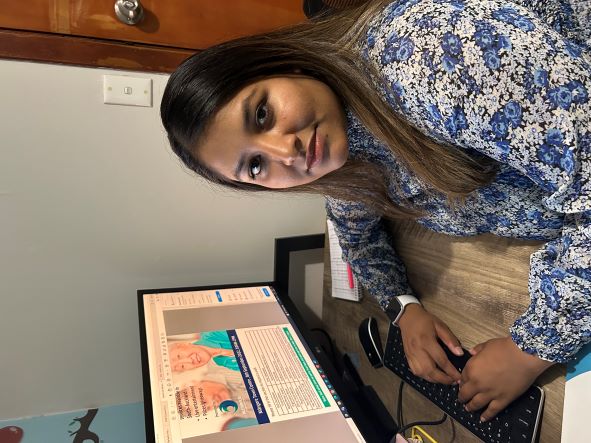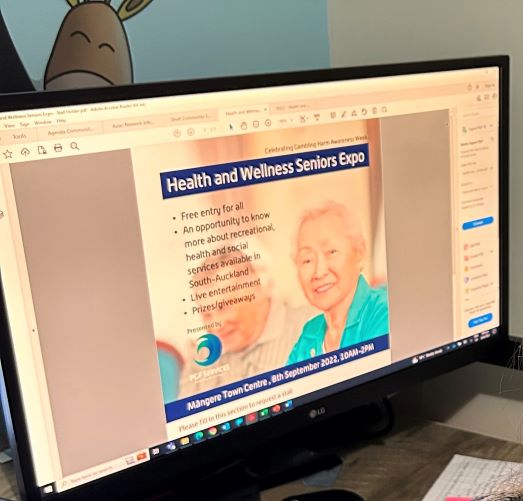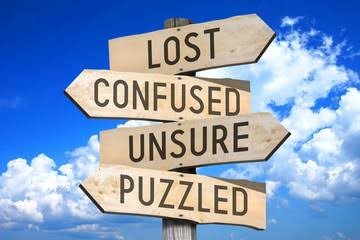Thriving on community challenges as health promoter

When Shayal Mala saw a health promoter job advertised with Age Concern Auckland she was keen to apply.
“I spent a lot of time with my grandparents as a child so I was really keen on a role where I could make a difference to old people,” says Shayal. A health promotion and public health AUT graduate, Shayal had been working as a dental assistant while looking for an ideal health promotion or public health role.
She got the job and worked at Age Concern for two years, loving the opportunity to utilise her qualifications in a practical way, and engage with a diverse range of people with different stories and needs.
“I did a lot of community educational workshops for older adults in areas like nutrition, falls prevention, mindfulness and improving sleep. I organised seminars around funeral preparation, advanced care planning and enduring power of attorney and wills.
I really enjoyed the ongoing participation of the community and engaging with individuals from different backgrounds,” says Shayal who was nominated as one six finalists for Westfield Manukau’s Local Heroes programme in 2021 for her work.
Problem gambling role
After two years Shayal moved to a new health promotion role at PGF Services (previously the Problem Gambling Foundation) looking for new challenges.
“A lot of my role at Age Concern involved adult education and I decided I wanted the challenge of more advocacy work in the community,” explains Shayal.
PGF Services provides free, confidential and professional support to anyone impacted by gambling harm – meaning support is available for gamblers as well as their friends, whānau and colleagues.
More than two billion dollars is lost each year on the four main types of gambling in New Zealand (TAB, NZ Lotteries, gaming machines outside casinos, and casinos). This figure doesn't include money spent on offshore online gambling which is becoming increasingly popular, explains Shayal.
She is part of the PGF Services public health team responsible for connecting with communities to raise awareness of gambling harm and support community wellbeing.
|"We provide education and training for staff to identify and screen for gambling harm, as well as guidance to develop organisational policies on gambling harm. It’s been very interesting and hard-hitting to learn more about the preventing and minimizing gambling harm (PMGH) sector. There is plenty of room to grow and achieve in this space. I feel I’ve only touched the tip of the iceberg,” says Shayal.
Older adult focus
Drawing on her past experiences at Age Concern, Shayal has also created an informative presentation about gambling harm and addiction for older people. The presentation covers information about gambling harm, the signs of gambling harm and where to seek help. The aim is to reach older adults who use gambling as a way to reduce their loneliness and to help older people identify signs of gambling harm in their own whānau members.
informative presentation about gambling harm and addiction for older people. The presentation covers information about gambling harm, the signs of gambling harm and where to seek help. The aim is to reach older adults who use gambling as a way to reduce their loneliness and to help older people identify signs of gambling harm in their own whānau members.
Shayal has also been involved in the Ministry of Health’s consultations on the new minimising gambling harm strategy and raised community awareness when the Department of Internal Affairs sought public submissions on reducing pokies harm in Class 4 venues in local communities.
She says over 60 percent of pokie venues are in New Zealand's most deprived communities and more than 30 percent of the money lost on pokies comes from people experiencing harm from gambling.
"Pokies are designed to be addictive – they play havoc with the reward systems in our brains, you just can’t beat the machine,” says Shayal, pointing out that New Zealanders lose nearly $1 billion on pokies in pubs, clubs and TABs every year.
Finding your place
It is important to find an organisation that is passionate about what you’re passionate about – a company with a vision and mission that aligns with your values, says Shayal.
“I truly believe it makes a huge difference being able to wake up, go to work and really enjoy what you do. I love being out in the community and helping people - for me money isn’t a motivator, but leaving a positive impression in people’s lives.”
She says there are many opportunities to increase your knowledge no matter what field you enter.
“I feel it is important to always increase your knowledge and skills, so being part of an organisation that values professional development was vital for me. I wanted to feel supported to pursue opportunities to help increase my skill set and be the best health promoter I can be. PGF Services has certainly provided this environment for me,” she says.
Drawing on qualifications
She also found her AUT degree set her up well.
“I got to learn about logic modelling, health promotion evaluations and health promotion principles. Learning more about Te Tiriti o Waitangi certainly showed me the greater challenges of working with kaupapa Māori as a non-Māori.
She says the practical placements she had at AUT gave her a taste of the various workplaces involved in the public health/health promotions sector.
"I also think having a wide understanding of what public health means really helps me,” says Shayal, adding she also really appreciated the supportive environment at the university.
Tips for finding a great role
*Form an idea of what you’re looking for, then talk to as many people as you can about what you’re interested in.
*Be true to yourself when you interview. We often want to say all the right thing or textbook answers but when you’re true to yourself and answer honestly and lay down your expectations, it makes everyone a lot more comfortable.
*Take the opportunity to attend career expos, and talk to organisations you are interested in.
*Interview, interview, interview! You learn so much by going through different recruitment processes.
*Ask for help and access support services available.
*DON’T GIVE UP!
Want career help?
AUT has lots of employability and career support for students and graduates, including workshops, career expos and events and one on one appointments. Find out more by signing into Elab Online.
CVs/Cover letters
- 7 Tips on creating a great CV
- Personal Statement? Career Objective? What?
- Why bother with LinkedIn?
- Why bother to write a cover letter?
Job search skills
Career advice
- Bringing passion into the mix
- Don't let rejection end your dream
- Employability Skills - how to figure them out!